How These Individuals And Brands Are Giving A New Meaning And A New Purpose To Temple Waste
No visit to a place of worship is complete without the classic temple offerings, to please and propitiate the gods. It is estimated that around 800 million tonnes of flowers are offered at temples, dargahs, and gurdwaras across the country. Often, these offerings end up as waste. But some brands and individuals are stopping temple waste from going to rivers. Instead, they are turning waste into useful resources like dyes and religious offerings.
-
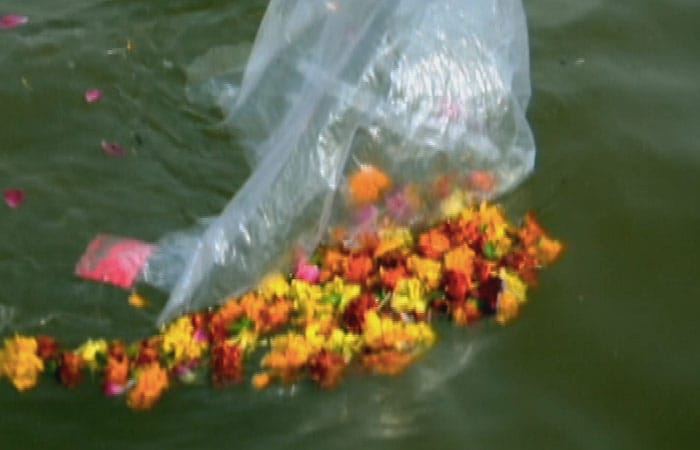 As per research by Pradip Kumar Maity for the International Journal for Research in Applied Science and Engineering Technology, about eight million tonnes of floral waste is dumped into rivers and other water bodies in India every year, choking and polluting them.
As per research by Pradip Kumar Maity for the International Journal for Research in Applied Science and Engineering Technology, about eight million tonnes of floral waste is dumped into rivers and other water bodies in India every year, choking and polluting them. -
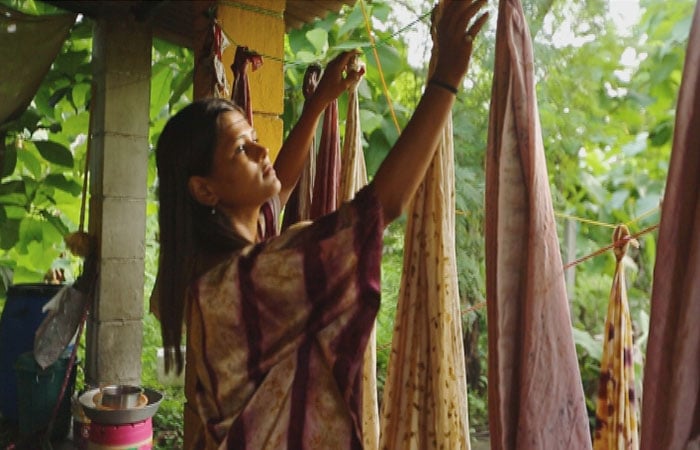 Jigisha Shukla from Vadodara runs a sustainable clothing brand called Bageeya. Bageeya not only promotes handwork and crafts, but also gives a purpose to floral waste in their second life as natural dyes that bring colour and texture to the brand's line of sustainable clothing.
Jigisha Shukla from Vadodara runs a sustainable clothing brand called Bageeya. Bageeya not only promotes handwork and crafts, but also gives a purpose to floral waste in their second life as natural dyes that bring colour and texture to the brand's line of sustainable clothing. -
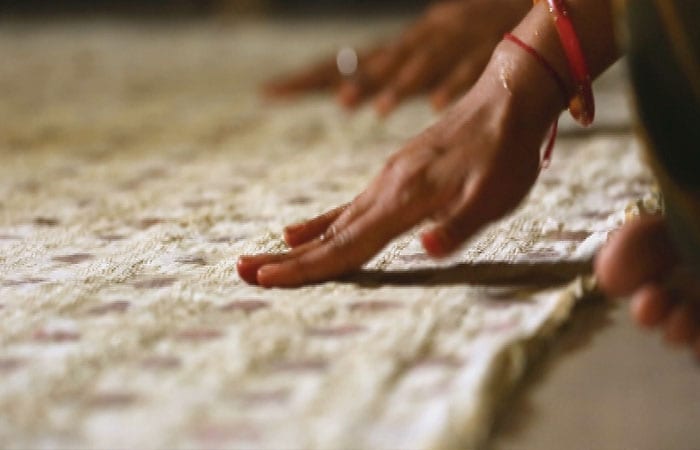 Jigisha and her team collect floral waste from nearby temples. They often get floral waste from weddings as well. The flowers go through extensive treatment before they are applied to fabrics.
Jigisha and her team collect floral waste from nearby temples. They often get floral waste from weddings as well. The flowers go through extensive treatment before they are applied to fabrics. -
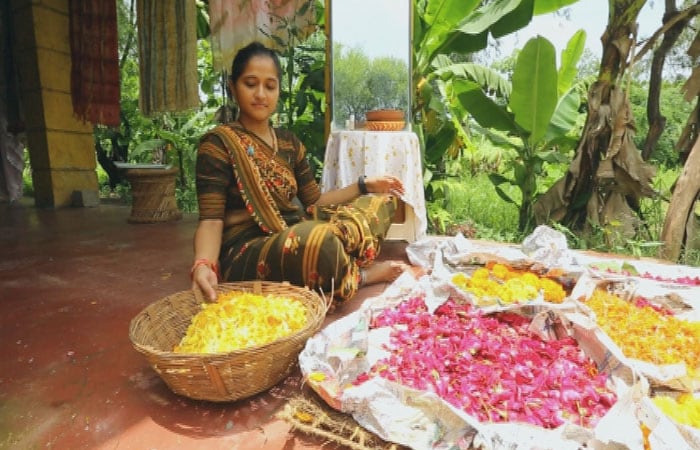 Bageeya works with temple flowers and herbs to create those prints. When it comes to temple flowers, they use roses and marigold; in terms of leaves, they use guava leaves and with the herbs, they use indigo, walnut, kattha, among others.
Bageeya works with temple flowers and herbs to create those prints. When it comes to temple flowers, they use roses and marigold; in terms of leaves, they use guava leaves and with the herbs, they use indigo, walnut, kattha, among others. -
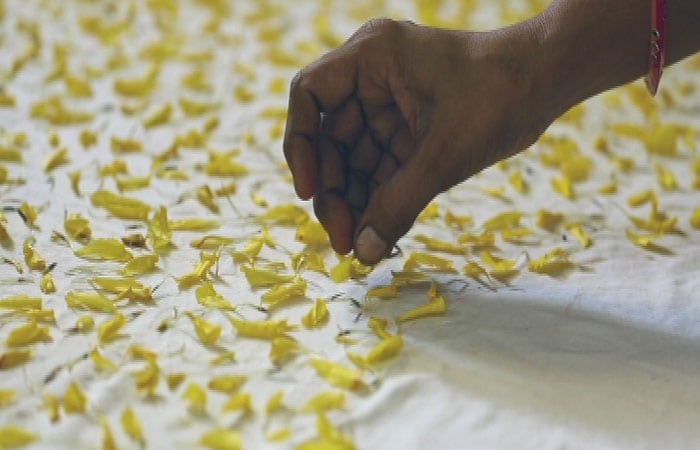 Apart from being biodegradable and organic, the floral dye has other advantages too. This dye isn't just good for the environment, but also for the body, mind, and soul. Jigisha explained, "In Ayurvastra, a branch of clothing science, it is said that when you wear something which is naturally dyed with herbs and flowers and if the garment is organic fabric then it rejuvenates your body."
Apart from being biodegradable and organic, the floral dye has other advantages too. This dye isn't just good for the environment, but also for the body, mind, and soul. Jigisha explained, "In Ayurvastra, a branch of clothing science, it is said that when you wear something which is naturally dyed with herbs and flowers and if the garment is organic fabric then it rejuvenates your body." -
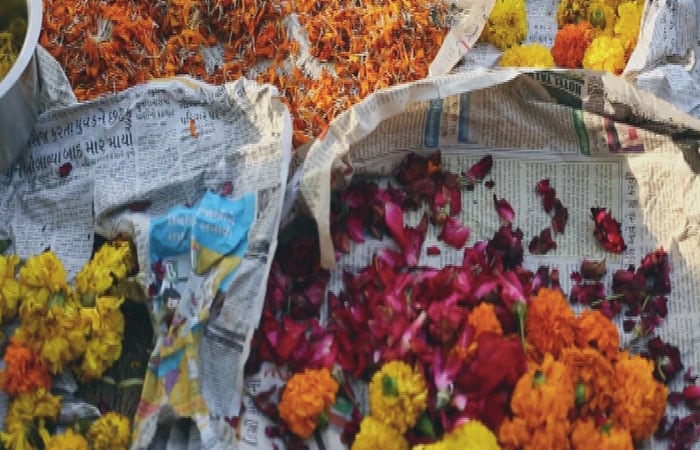 Though eco-printing has been practiced in India for a very long time, some artisans are still very new to this concept. So, Jigisha has to train women artisans.
Though eco-printing has been practiced in India for a very long time, some artisans are still very new to this concept. So, Jigisha has to train women artisans. -
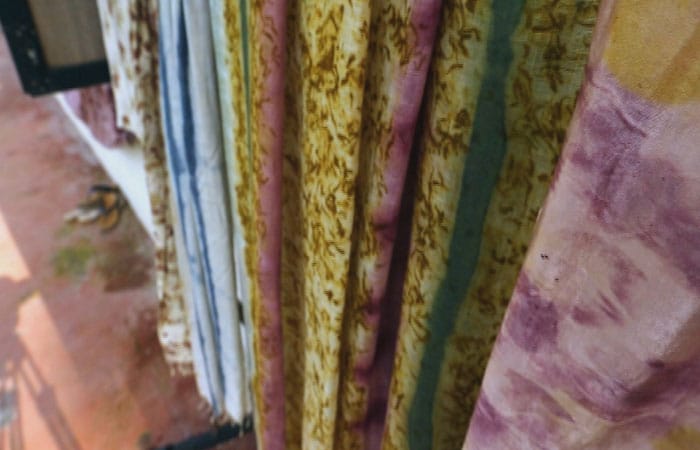 Bageeya is not only turning waste into a resource, but the process followed for dying a piece of cloth is also eco-friendly. The water is used to wash utensils or mop the floor before it is discarded. The chemicals in the water are within permissible limits, and hence do not pollute the groundwater.
Bageeya is not only turning waste into a resource, but the process followed for dying a piece of cloth is also eco-friendly. The water is used to wash utensils or mop the floor before it is discarded. The chemicals in the water are within permissible limits, and hence do not pollute the groundwater. -
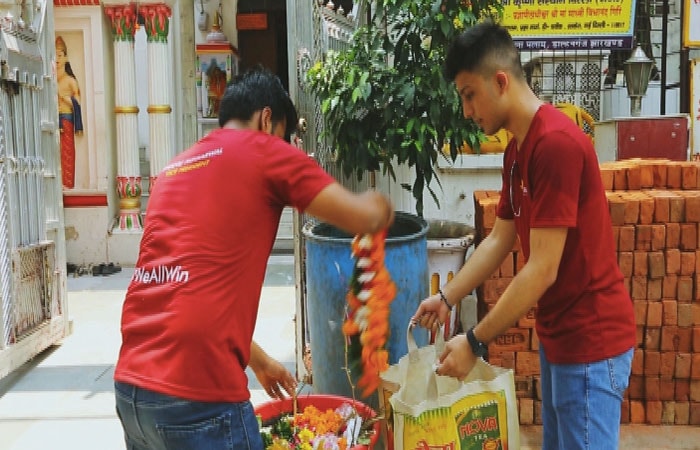 Another group putting temple waste to good use is the students of Aryabhatta College, University of Delhi. The students of the college club Enactus Aryabhatta run several community-based projects, one of which is Project Palaash.
Another group putting temple waste to good use is the students of Aryabhatta College, University of Delhi. The students of the college club Enactus Aryabhatta run several community-based projects, one of which is Project Palaash. -
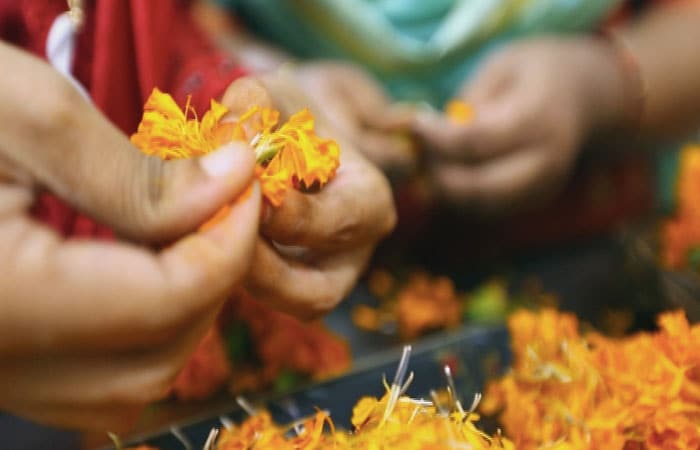 Project Palaash was started in 2019 with a vision to safeguard life underwater by tackling the problem of poor waste management in urban temples. The team collects around 300-400 kgs of flowers from temples across Delhi. on a weekly basis and takes them to the production facility, which is an NGO.
Project Palaash was started in 2019 with a vision to safeguard life underwater by tackling the problem of poor waste management in urban temples. The team collects around 300-400 kgs of flowers from temples across Delhi. on a weekly basis and takes them to the production facility, which is an NGO. -
 Project Palaash has collaborated with several NGOs across Delhi, giving employment opportunities to a wide range of people. It employees around 400 to 500 beneficiaries in all its verticals, all its seasonal campaigns throughout the year.
Project Palaash has collaborated with several NGOs across Delhi, giving employment opportunities to a wide range of people. It employees around 400 to 500 beneficiaries in all its verticals, all its seasonal campaigns throughout the year. -
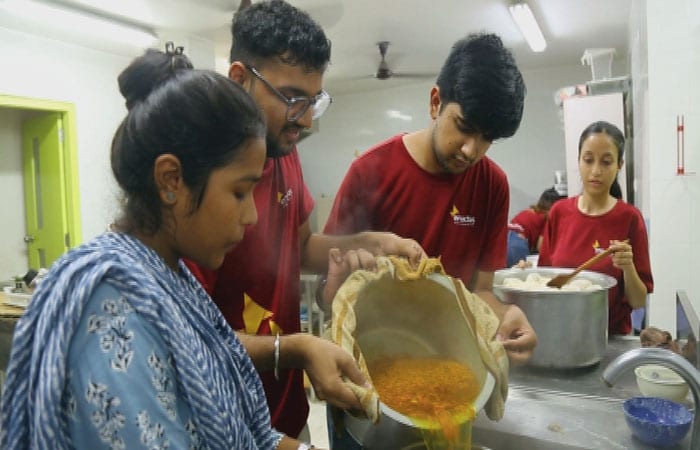 The team often gets rotten waste, that cannot be used in production. But they see that as a resource as well, and send it off to a composting centre. The other floral waste, fit for dyeing, is sent to natural dyeing centres. Currently, they have 5 different centres, and are in the process of setting up two more.
The team often gets rotten waste, that cannot be used in production. But they see that as a resource as well, and send it off to a composting centre. The other floral waste, fit for dyeing, is sent to natural dyeing centres. Currently, they have 5 different centres, and are in the process of setting up two more. -
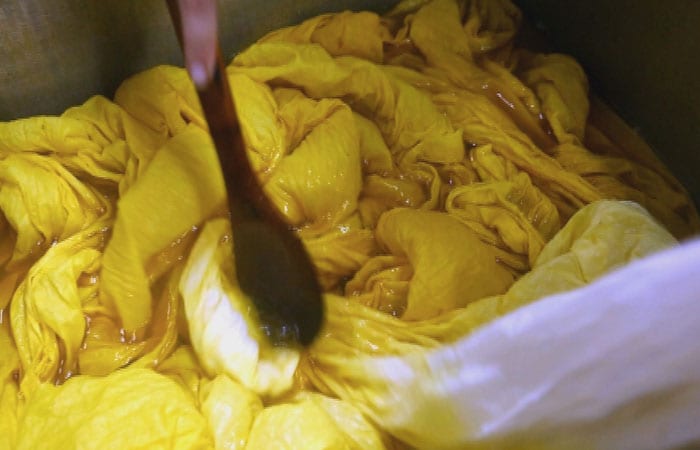 Project Palaash has had a huge calculated impact in the last year or so of reducing 30,000 kilos of chemical pollution, by using natural dyes. Other than that, they have salvaged over 7,000-8,000 kilos of floral waste.
Project Palaash has had a huge calculated impact in the last year or so of reducing 30,000 kilos of chemical pollution, by using natural dyes. Other than that, they have salvaged over 7,000-8,000 kilos of floral waste. -
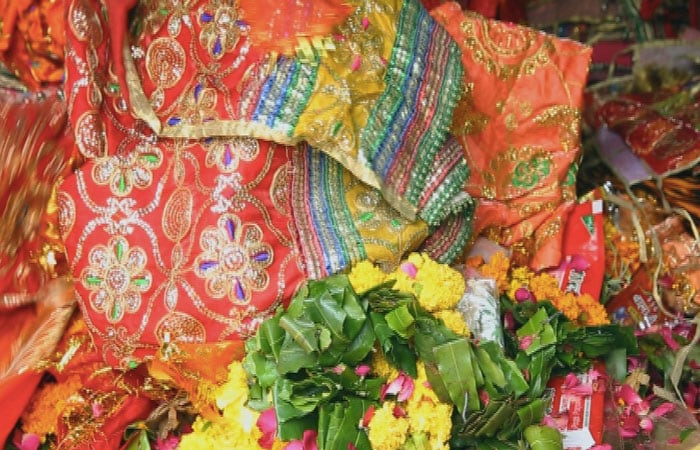 Temple waste isn't just flowers. Often old clothes, offered to the gods, are also dumped into our rivers - too ‘sacred' to be disposed of as garbage. Certain rituals also demand the offering of clothes, milk, flowers, by floating them down a river or into a lake.
Temple waste isn't just flowers. Often old clothes, offered to the gods, are also dumped into our rivers - too ‘sacred' to be disposed of as garbage. Certain rituals also demand the offering of clothes, milk, flowers, by floating them down a river or into a lake. -
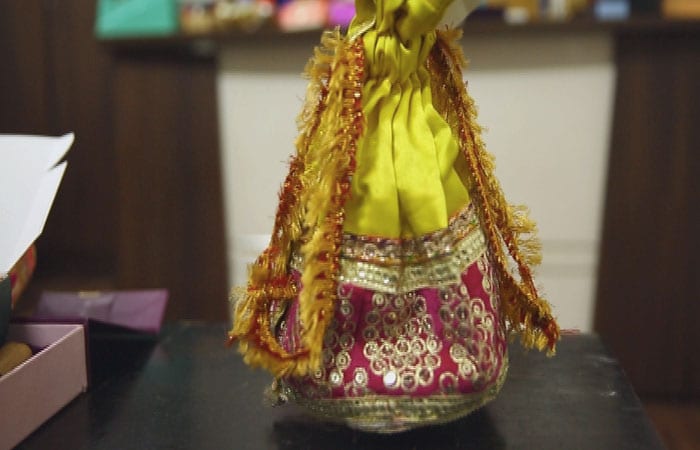 Set up in 2020 by Rajiv Bansal, Nirmalaya, formerly known as Recycle Aastha, strives to restore these sacred temple offerings by transforming them into eco-friendly products. They have tied up with more than 300 temples in Delhi to collect temple waste.
Set up in 2020 by Rajiv Bansal, Nirmalaya, formerly known as Recycle Aastha, strives to restore these sacred temple offerings by transforming them into eco-friendly products. They have tied up with more than 300 temples in Delhi to collect temple waste. -
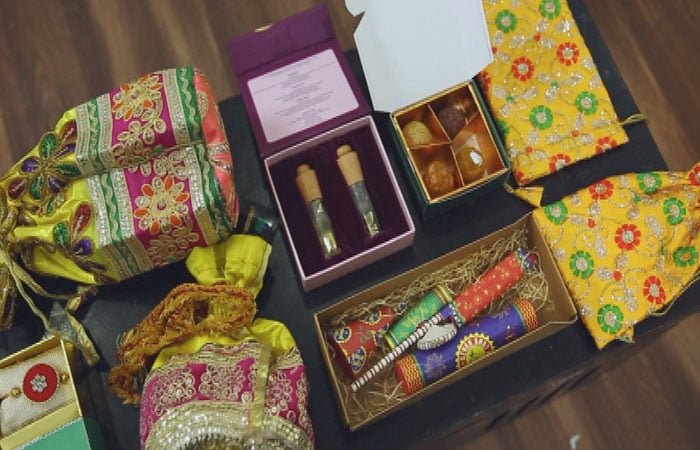 Nirmalaya manufactures incense sticks, dhoop sticks, and other prayer materials from the flowers. They also make fortune bags, money envelopes, and decorative festoons from the clothes that are offered to the gods.
Nirmalaya manufactures incense sticks, dhoop sticks, and other prayer materials from the flowers. They also make fortune bags, money envelopes, and decorative festoons from the clothes that are offered to the gods.
Advertisement
Advertisement
Advertisement
Advertisement
